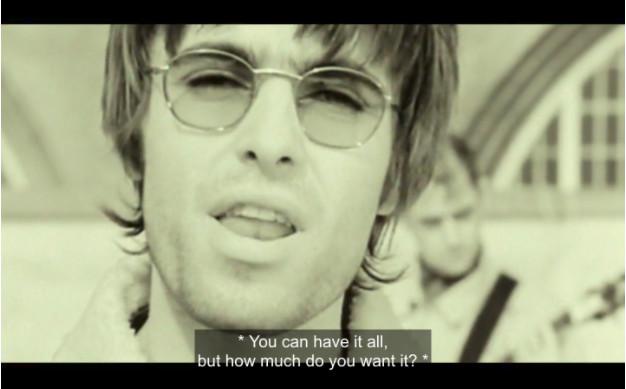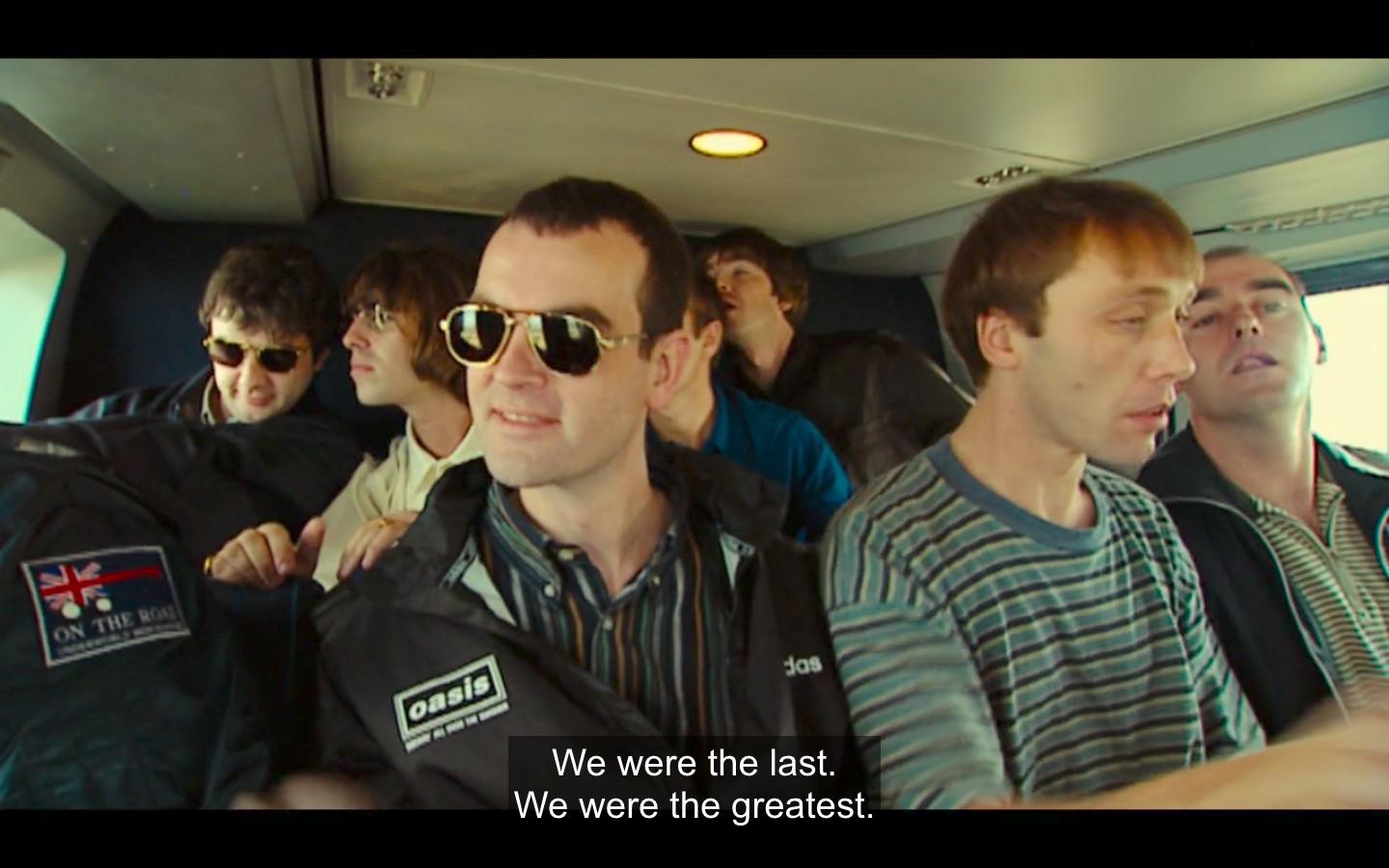World, meet Liam Gallagher, solo artist. Last week, the delightfully tempestuous former Oasis frontman finally released his first album under his own name, As You Were—a spry and only slightly bloated fount of hip-shaking, tambourine-waving, grouchily anthemic bluster. It is perfectly lovely, but in terms of unfadeable rock-star charisma, it pales in comparison with this recent 36-second BBC video of Liam complaining about having to brew his own tea.
In his defense, this clip blows away most other 2017 albums in terms of unfadeable rock-star charisma. “Now, in the ’90s, I got someone else to fuckin’ do it,” Liam tells the camera, affably resigned. “Well, now I can’t. Fuckin’ money is tight, too tight to mention. Got to do it yourself, haven’t ya? No one buys records these days. In the ’90s I had about four people doin’ it.”
He gestures at four spots along the table. Boom. “Little geezer doing the kettle.” Boom. “Our kid.” Boom. “Some little [bleep] doing that.” Boom. “And some other little fuckin’ idiot doing that.” There’s a quick cut to Liam stirring his cup, and even that feels like too quotidian an action for someone of his stature. “Now you gotta do it yourself these days, know what I mean?” he says. “Because these fuckin’ smartasses download fuckin’ tunes for nish. And you wonder why there’s no real rock ’n’ roll stars around. ’Cause this is the shit you got us doing. Fuckers.”
An underrated aspect of this rant is the quick shout-out to our kid, an endearing bit of Northern England slang that here refers to Liam’s older brother and mortal enemy, Noel Gallagher, who served as Oasis’s lead guitarist and songwriter. Oasis ruled the world—and particularly the U.K.—for a goodly chunk of the ’90s. They were pugnacious and anthemic arena-rock scamps whose first two albums, 1994’s Definitely Maybe and 1995’s (What’s the Story) Morning Glory?, are all-timers, like bar fights with the tender scope of Homeric epics. (You’ve likely heard “Wonderwall” and “Supersonic” plenty; you’ve likely not heard “Slide Away” or “Cast No Shadow” nearly enough.)
In that brief but monumental span, Oasis could conceivably call themselves The Biggest Band in the World, or, more to the point, they were the only credible candidates brash and uncouth enough to regularly call themselves The Biggest Band in the World. Most ’90s alt-rock stars, from Pearl Jam to Nirvana to Nine Inch Nails, had to at least pretend to be conflicted about their hugeness; Radiohead, whom the Gallagher brothers have always hilariously loathed, practically weaponized that sort of self-contempt. Oasis were the only applicants who actually wanted the job. Such is the lesson of Mat Whitecross’s 2016 documentary Oasis: Supersonic, which lovingly and brutally depicts those rowdy first three years in which the band made those first two transcendent records and discreetly avoids the 13 years and five wildly inferior full-length records that followed.
This is the history that follows Liam everywhere, that colors everything he does now (like make his own tea) and everything he doesn’t do now (like top the charts). Oasis broke up in 2009 following a Parisian backstage brawl wherein the Gallagher brothers allegedly threw both guitars and fruit at one another. Noel started the band Noel Gallagher’s High Flying Birds soon thereafter, while Liam convened Beady Eye, an Oasis-minus-Noel quasi-supergroup that couldn’t live up to the myth and broke up in 2014. The road to As You Were has been laborious, and the record’s mood is very grudgingly apologetic. The prettiest and most contrite ballad is called “For What It’s Worth,” and starts with the line “In my defense all my intentions were good,” though by the second verse Liam’s reconsidering his remorse: “’Cause I’ve been crucified just for being alive.” Here is a verse from a stormy, acoustic-driven song called “All My People / All Mankind”:
Stand down
And less of the cheese
Selfies
What a fuckin’ disease
I just want you to know
It’s my time
It is not Liam Gallagher’s time, but that is what makes this time in Liam Gallagher’s life so fascinating. He now resides in the rare and not-undignified tier of Artists Whose Press Interviews Are More Memorable Than Their Records, along with Father John Misty and John Mayer and, come to think of it, our kid. That is not the company Liam wants, of course. But not playing well with others is still what he does best.
Here is Liam Gallagher, early on in Oasis: Supersonic, summarizing his approach to the band’s early years: “I didn’t really get involved with the music kind of thing, I was like, ‘Look that’s your thing, you do that, I’ll just be cool as fuck over there.’”

By you, he means Noel, of course, and what’s charming about the movie is how simultaneously self-aggrandizing and deferential both Gallaghers can be. Noel will tout his own musical genius one minute and rhapsodize his little brother’s superior rock-star quality the next: Of Liam, he admits, “There’s not a day go by where I don’t wish I could rock a parka like that man.”
Liam indeed cut a striking figure in the mid-’90s, razor-cheekboned and eerily Lennonesque, though his default onstage posture—hands clasped behind his back, face tilted up toward the microphone—had a very endearing and supplicating quality. His voice was nasal and surly and brutishly memorable. More importantly, he understood the importance of getting the look right. In Supersonic, when Noel fires the band’s first drummer, Liam recalls meeting the new guy: “He starts talking about the drums, and I’m like, “I’m fuckin’ not interested in how you can play. As long as you look the part, you’ll do.”
The tunes—particularly (What’s the Story) Morning Glory?’s massive “Don’t Look Back in Anger,” on which Noel handled lead vocals—managed to outshine the sibling-rivalry circus for quite a while. But Oasis, very much by the band’s own admission, likely peaked with two gigantic 1996 shows in Knebworth, England, that reportedly packed in 250,000 people. That’s where Supersonic’s narrative triumphantly concludes; “We should’ve disappeared into a puff of smoke,” Noel says, ruefully, willing the ensuing two decades of pompously diminishing returns and tabloid acrimony to have never happened. Here they are heading to the Knebworth stage via helicopter.

What’s striking about Liam’s As You Were is that it legitimately sounds like the last 20 years never happened, for him personally or for music as a whole. “To be honest with you, I don’t want to reinvent the wheel,” he told Esquire earlier this month. “The wheel is fine as it is. It goes round and round, and God bless it for going round and round. I’m not here to change rock and roll, I just want to keep it going, you know what I mean?”
Liam’s voice, still sharp and distinct, is a welcome slap in the face, but musically the record leans heavily on mid-tier festival rock, its gestures occasionally grand but usually empty. Liam wrote or cowrote most of the songs, but leans so heavily on Noel’s nod-to-the-classics tics that you may not notice. This mostly involves stuff like rhyming gimme shelter with helter skelter, or pointing out that “Happiness is still a warm gun” on “Chinatown,” a hokey but disarmingly lovely acoustic tune that evokes some of that old Oasis grandeur without trying too hard.
But nobody comes to Liam Gallagher for the tunes. It is a thrill to hear him sink his fangs into an opening line like “Gonna take you off my list of to-dos”: Maybe he means that to be contrite, but it sure sounds like he doesn’t, and that’s what matters. But the lingering joys of the As You Were experience are mostly press-tour-related. There is his evolving position on James Corden: Dismissing poor James as a “knobhead” earlier this year, Liam more recently allowed that he was “a fine chap.” Or consider this majestic, fiery, and also somehow extremely vulnerable excerpt from a British GQ feature, when the topic of Noel comes up again, and specifically the question of whether Noel and Liam’s other various enemies might be rooting for As You Were to flop:
By this point, Gallagher is more or less standing on the table. "I'm f***ing glad I'm back, mate, because I know for a fact they're sitting there— and you say they might be happy—but they're sitting there going, ‘F*** me, mate. He's come again, man. Two divorces, f***ing illegitimate kids, f***ing two failed bands behind him, three bad haircuts and he's still f***ing coming.’ Oh, and I'm gonna f***ing come even more, mate, do you know what I mean? Because that's the way it is. That's who I am. That's what I do. I'm not gonna sit back and let them win. So they should be f***ing scared. They should be afraid. Without a doubt. This is the third coming."
Now that’s an interview. This is very likely not the third coming. But in a year this dark and this moribund rock-star-personality-wise, it’s gratifying to have the Gallaghers around, still brightening the corners and bickering at the margins. In the aftermath of the terrorist attack at Ariana Grande’s Manchester show in May, “Don’t Look Back in Anger” became a deeply moving anthem for Oasis’s home city; Chris Martin and Ariana herself sang it at the subsequent One Love Manchester benefit concert, where Liam himself showed up to join Martin on “Live Forever,” acknowledging the gravity of the moment whilst rocking the hell out of an orange parka. Noel couldn’t make that show, and, naturally, he and Liam ended up squabbling bitterly in the press about it. But they both also donated their respective shares of the song’s royalties to a Manchester benefit fund, having long ago decided to use their volatility and enmity toward each other to enrich the wider world, or at least keep it reasonably entertained.
This is Liam Gallagher, in 2017 as in 1994, his adversarial instincts indistinguishable from his benevolent ones, his profundities indistinguishable from his frivolities. Here’s this week’s version of the make-my-own-tea rant:
You wouldn’t exactly call that answer politically astute (or politically correct), but it’s just a tick more thoughtful, or at least more fanciful, than your average quote from a musician. He’s full of surprises, of new ways to shock and offend and disarm and amuse. It’s what rock stars do.
